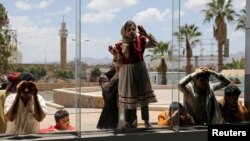The International Committee of the Red Cross said Monday that the warring sides in Yemen have released nearly a thousand detainees over four days.
“These release operations reunited hundreds of families just in time for Eid celebrations,” said Daphnee Maret, ICRC’s head of delegation in Yemen. “They were enabled by powerful acts of goodwill that will hopefully also bring us closer to seeing an end to the conflict and to years of human suffering.”
From April 14 to 16, the ICRC says it operated 15 flights that saw 869 detainees returned to four cities in Yemen and two in Saudi Arabia.
Additionally, the Saudi-led coalition requested that the ICRC facilitate a separate unilateral release of 104 detainees from Saudi Arabia to Yemen.
The developments come a month after an agreement between Saudi Arabia and Iran to restore ties. Saudi Arabia has backed Yemen’s internationally recognized government, while Iran supports the Houthi rebels who seized Yemen’s capital in 2014.
U.N. Special Envoy for Yemen, Hans Grundberg, told the U.N. Security Council Monday that Yemen is at a “critical juncture.”
“I believe we have not seen such a serious opportunity for making progress towards ending the conflict in eight years,” he said in a video briefing. “But the tide could still turn unless the parties take bolder steps toward peace.”
He warned that recent military activity in the governorates of Marib, Shabwa, Taiz and elsewhere could spill over, and he urged maximum restraint and for the parties to refrain from provocative actions and continue to engage with his office on de-escalation.
There has been recent engagement between the Saudis and Omanis with the Houthis in Sana’a, as well as Saudi discussions with their allies on the Presidential Leadership council.
“Any new agreement in Yemen must be a clear step toward a Yemeni-led political process,” Grundberg said. “It needs to include a strong commitment from the parties to meet and negotiate in good faith with one another.”
The conflict in Yemen has exacerbated an already tough humanitarian situation, with the United Nations estimating 80% of the population needs humanitarian aid and protection.
Chris Hannas contributed to this report.





